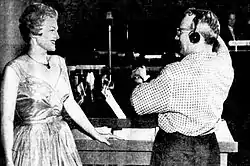The Jo Stafford Show (1954 TV series)
The Jo Stafford Show is a 15-minute musical variety program which aired on CBS in prime time in the 1954–1955 television season.[1][2] Jo Stafford began her solo singing career after success with the big band group known as The Pied Pipers.[3] Arrangements for the program were handled by Stafford's husband, Paul Weston, himself a conductor and arranger at Capitol Records and Columbia Records.[4][5][6][7] The series aired on Tuesday evenings at 7:45 Eastern Time after Douglas Edwards with the News and preceding the half-hour The Red Skelton Show. Singer Perry Como had a similar 15-minute program on CBS in the same time slot on Monday, Wednesday, and Friday evenings.[8][9] Paul Weston wrote a special theme song for the show.[4]

| The Jo Stafford Show | |
|---|---|
 Jo Stafford and husband/conductor Paul Weston on The Jo Stafford Show. | |
| Genre | Variety |
| Starring | Jo Stafford |
| Country of origin | United States |
| Original language | English |
| No. of seasons | 1 |
| Production | |
| Camera setup | Multi-camera |
| Running time | 15 minutes |
| Release | |
| Original network | CBS |
| Picture format | Black-and-white |
| Audio format | Monaural |
| Original release | 1954 – 1955 |
| Chronology | |
| Preceded by | Douglas Edwards with the News (7:30 pm EST, 1954–1955) |
| Followed by | The Red Skelton Show (8 p.m. EST, 1954–1955) |
| Related shows | The Tony Martin Show The Dinah Shore Show |
The show had the same cast of regular performers Stafford worked with during her Chesterfield Supper Club shows from Hollywood. Paul Weston and his Orchestra and the Starlighters provided the music and vocal accompaniments on the television show just as they had done on Stafford's hosted "Supper Club" radio programs.[10][11][12]
The television program was done live. During the year it aired, an episode featured loss of her skirt on one show while singing "Let Me Go, Lover!". One of the cast members tripped, and as he fell, a button on his coat caught in Stafford's costume. Her skirt falling along with the actor, Stafford tried holding onto it while singing "Let me go".[13]
The decision to end Stafford's television program was not hers, but that of CBS. At the time of the cancellation, the show's sponsor, Gold Seal Company, contemplated moving the Stafford program to NBC. The loss of the television show was another factor in Stafford's move from Columbia Records, owned by CBS, back to Capitol Records, where she had her first solo recording contract.[14][15] Stafford received an Emmy nomination in 1955 as Best Female Singer for her work on the program.[16]
Stafford was born in Coalinga, California. Though she had been trained as a teenager in opera, she instead joined her two sisters, Christine and Pauline, to form the Stafford Sisters vocal group. One reason for her shift away from opera was the decline in popularity of that genre during the Great Depression.[3][17] Her career spanned five decades from the late 1920s to the early 1960s. From 1949 until 1953, Stafford made at least four hundred broadcasts for Radio Luxembourg and the Voice of America.[18][19] In 1961, Stafford also had a short-lived series of musical specials on British television, with American and British guests.[20][21]
The Jo Stafford Show aired during a period when 15-minute prime time programs were relatively common. Such offerings began as early as the 1948–1949 television season, but they had largely disappeared by the time of the 1957–1958 season.[22]
References
- O'Brian, Jack (September 1, 1954). "Critic Believes Jo Stafford Should Stay In Vocal Groove". Reading Eagle. Retrieved March 12, 2011.
- Pearson, Howard (February 12, 1954). "Jo Stafford TV Show Sets Debut Friday". The Deseret News. Retrieved March 12, 2011.
- "Jo Stafford, singer known as 'GI Jo'". The Press Democrat. July 19, 2008. Retrieved January 9, 2011.
- "The Jo Stafford Show (musical variety)". classicthemes.com. Retrieved March 11, 2011.
- Robertson, Hal (May 30, 1954). "In This TV Family-The Little Woman Takes Orders". The Milwaukee Sentinel. p. 10.
- "Jo Stafford". The Telegraph. July 17, 2008. Retrieved January 28, 2011.
- "No Big Money In TV? Jo Stafford Laughs At That". The Milwaukee Sentinel. September 15, 1955.
- Boyle, Hal (January 25, 1955). "Perry Como Turns Down $250,000 A Year To Relax". The Tuscaloosa News. Retrieved May 4, 2010.
- Graham, Sheilah (February 25, 1955). "Hollywood". Pittsburgh Post Gazette. Retrieved March 12, 2011.
- Ad for 'Chesterfield Supper Club'. Life. January 13, 1947. Retrieved November 26, 2010.
- Music industry trade ad for The Starlighters. Billboard. January 24, 1948. Retrieved April 6, 2011.
- Music industry trade ad for "Smoke Dreams" record. Billboard. May 31, 1947. Retrieved April 6, 2011.
- Johnson, Erskine (March 9, 1955). "Hollywood Today". The Daily Reporter. Retrieved March 12, 2011.
- O'Brian, Jack (May 1, 1955). "Meadows-Allen Duo to Air 'Psychiatrist'". St. Petersburg Times. Retrieved September 1, 2013.
- Franklin, Nancy (August 26, 1996). A Voice from Home. The New Yorker. Retrieved September 13, 2012.
- "Emmy Awards Database-Jo Stafford". Academy of Television Arts & Sciences. 1955. Retrieved September 20, 2013.
- "Jo Stafford". Internet Movie Data Base. Retrieved March 11, 2011.
- Thomas, Bob (January 31, 1950). "Chirper Jo Stafford Spins U.S. Records For Europeans". Eugene Register-Guard. Retrieved January 9, 2011.
- "Uncle Sam's Gal Jo Upsets Joe Stalin". The Pittsburgh Press. July 8, 1951. Retrieved January 9, 2011.
- "Cherished Television: The Jo Stafford Show". cherishedtelevision.com. Retrieved March 11, 2011.
- Fanning, Win (January 16, 1964). "Jo Stafford's Show to Premiere Soon". Pittsburgh Post-Gazette. Retrieved March 18, 2011.
- Alex McNeil, Total Television, appendix, network television schedules